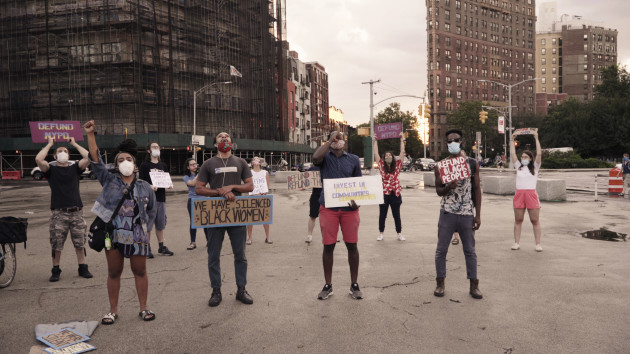
by admin
Why We’re Doing Public Teshuvah to Fight White Supremacy

Photo by Hannah Roodman
Heading to Grand Army Plaza at 7:20 pm. Seeing a group start to gather, forming a circle. Picking up the protest sign that speaks to me from the middle of the circle. Finding a place in the circle to stand and hold up the sign. Stepping into the center to share what aspect of systemic racism I am mourning that day. Or, stepping into the circle to confess how I myself have participated in and perpetuated racism and anti-Blackness. Actively listening. Turning my body East at 8:00 pm. Blowing the shofar for one long breath. Hearing those around me cry out to the Heavens. Standing silently for a moment. Turning back to face the circle. Stepping into the circle again, this time to share a specific way that I will be actively anti-racist moving forward —my commitment to this community. Actively listening. Putting the protest sign back in the middle of the circle. Saying hello to friends and community members. Returning home.
This is a new ritual, created by Yehudah Webster, JFREJ community organizer and my dear friend. Every night for the 40 days leading up to Tisha b’Av, Yehudah has led a community in mourning the destruction of Black lives and doing teshuvah for the baseless hatred of racism and white supremacy.
On Tisha b’Av (9th of Av), we mourn the destruction of the First and Second Temples, as well as other catastrophes and traumas in Jewish history and memory. We do teshuvah, which translates to “return”: a process of reparation and communal accountability necessary for collective transformation, within which we confess to our wrongdoings, and the harms we have committed. We do teshuvah on Tisha b’Av because we were and are responsible for our destruction. We abandoned HaShem and practiced sinat chinam (baseless hatred).
In 2020 it’s clear that we, as a Jewish community, like the larger communities we belong to, have worshipped the idols of white supremacy and racist capitalism. We have failed to recognize the divinity of each and every human being. We have not pursued justice. Rather, we have perpetuated the baseless hatred of racism and anti-Blackness, bringing about our own destruction and sending ourselves into the depths of exile.
Participating in 40DaysofTeshuvah, I’ve been struck by the idea of return. On one hand, spiritually and religiously, we know what, or who, we are to return to—Hashem. That is why we gather to cry out – to reestablish our communication with Hashem. As Yehudah says, we call on Hashem to “be our co-conspirator in justice.”
But on the other hand, physically speaking, we need to return to a world that we don’t yet know. A world that has to be imagined and created—a world that does not yet exist and that we have not yet experienced. In 40DaysofTeshuvah, when we mourn, confess, and commit, we are engaging in a return to the unknown. Or rather, we are returning to the world we’d like to create.
The ritualization of this return has been powerful. Revisiting the holy space that Yehudah has so graciously and thoughtfully created, day after day, has allowed us all to embody this vision, a world in which all are liberated. White supremacy is so deeply ingrained in our being—in our bodies and in our muscle memory. Thus, the work to dismantle it, must also be physical and bodily. We cannot simply rely on our minds to do this work. We must train our bodies, too, changing the ways that we move and take up space in this world.
A daily, embodied ritual allows you to truly practice anti-racism. 40DaysofTeshuvah ensures that at least for a couple of hours every day, I am mourning, confessing, and committing.
The power of ritual is that our habits or routines become rooted in our deepest beliefs, relationships, values, and traditions. We must root our internal, interpersonal, and institutional work to fight and unlearn white supremacy in our relationship with Torah, divinity, and holiness.
As 40DaysofTeshuvah grew a bit each day, it began to feel like a minyan: A socially-distant quorum of accountability.
Come the 10th of Av, we will not be heading to Grand Army Plaza at 7:20 pm. Instead, deeply moved by Yehudah’s ritual, we must create and sustain our own minyanim to imagine, practice and embody our teshuvah–our return to a world not yet realized.